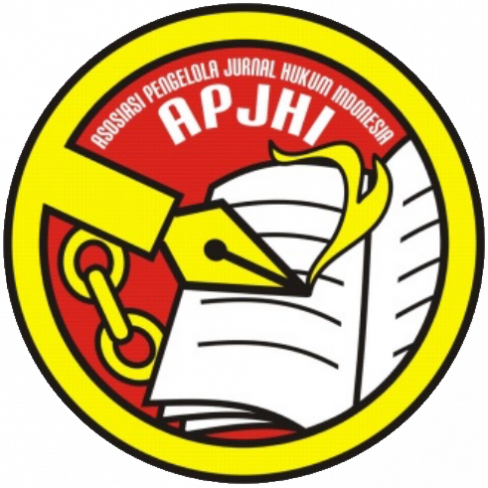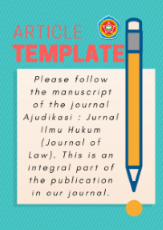Pengambilan Harta Wakaf Perpektif Hukum Islam dan Undang-Undang No. 41 Tahun 2004 (Studi Kasus di Desa Karang Anyar Kec. Jati Agung Kab. Lam-Sel Tahun 2016)
DOI:
https://doi.org/10.30656/ajudikasi.v2i1.620Abstract
According to Islamic Law, Wakaf is to give up land or other objects that can be utilized by the Islamic Ummah without damaging the Wakaf objects and to grant the Wakaf objects to someone or to a legal entity to be utilized for the benefit of Islamic Ummah. Based on Agrarian Law, wakaf is an eternal transfer of right.
The consequence is that the land becomes institutionalized forever and the right to land can no longer be transfered to the other partie either by means of trading, exchanging, granting and so on unless there is a legal reason allowing it.his analytical descriptive study with sociological juridical approach described the fact found in the community of Percut Jati Agung subdistrict.
The result of this study showed that the problematic of wakaf land registrationin in karang anyar Percut jati agung subdistrict, lampung selatan District were 1) the community members living in Percut jati agung Subdistrict did not understand much especially about wakaf land registration and certification, 2) the wakif (the one donates the wakaf object) could not issue the certificate for the donated land, while the declaration of wakaf (donation) had been made at KUA by PPAIW, and 3) the personnel working of KUA or BPN was very minimal that many declarations of donated land at KUA or Registrations of the donated land at BPN have not been handled. In the process of donated land registration.
The related parties are suggested to handle the wakaf cases more maximally and to socialize the land registration and land donation that it can create a legal awareness in the community members and they understand the importance of land registrationDownloads
References
Abdul Ghafur Anshori, Hukum dan Praktik Perwakafan, Yogyakarta: Nuansa Aksara 2006.
Abdurrahman, Kompilasi Hukum Islam, Jakarta: Akademika Pressindo, 2007.
Abi Daud, Sunan Abi Daud Jilid II, Beirut: Darul Fikr, 1994.
Abi Ishak Ibrahim Ibn Ali Ibn Yusuf Al-Syirozi, Al-Muhadzab, Beirut: Darul Fikr, 1993.
Achmad Djunaidi dan Thobieb Al-Asyhar, Menuju Era Wakaf Produktif, Sebuah UpayaProgresif Untuk Kesejahteraan Umat, Cet. ke-3 Jakarta: Mitra Abadi Press, 2006.
Adrian Sutedi, Peralihan Hak Atas Tanah dan Pendaftarannya, Jakarta: Sinar Grafika, 2014.
Agus Pamungkas, Amandemen Undang-Undang Dasar 1945, yogyakarta: buku pintar, 2011.
Dalman, Menulis Karya Ilmiah, Ed. 1, Cet. Ke-3 Jakarta: Rajawali Pers, 2003.
Departemen Agama RI. Al-Qur’an dan Terjemahannya, Bandung: Diponegoro, 2008.
Departemen Pendidikaan Nasional, Kamus Besar Bahasa Indonesia, Jakarta: Gramedia Pustaka Utama, 2007.
Direktorat Pemberdayaan Wakaf Dirjen Bimas Islam, Fiqih Wakaf, Jakarta Deprtemen Agama, 2006.
Ibnu Majah, Sunan Ibnu Majah Jilid II, Beirut: Darul Fikr, 1993.
Imam Taqiyuddin Abubakar bin Muhammad Al Husaini, Kifayatul Ahyar Fii Halli Ghayatil Ikhtisar, alih bahasa: Syarifuddin Anwar, Kifatul Ahyar, Surabaya: CV Bina Imam, 2007.
Miftahul Huda, Mengalirkan Manfaat Wakaf Potret Perkembangan Hukum dan Tata Kelola Wakaf di Indonesia, Bekasi: Gramata Publishing, 2015.
Muhammad bin Ibrahim bin Abdullah At-Tuwaijiri, Ensiklopedi Islam Al- Kamil, Jakarta: Darus Sunnah Press, 2010.
Muhammad Jawad Mughniyah, Fiqih Lima Mazhab diterjemahkan dari kitab al-fiqh ‘ala al-madzahibal-khamsah, Jakarta: penerbit lentera, 2006.
Mukhlisin, Ahmad, dan Nur Hamidah. “PEMANFAATAN HARTA WAKAF DI LUAR IKRAR WAKAF PERSPEKTIF HUKUM ISLAM DAN UU NO. 41 TAHUN 2004 (Analisis Pemanfaatan Harta Wakaf di Desa Taman Fajar Kecamatan Purbolinggo Lampung Tengah).†Mahkamah: Jurnal Kajian Hukum Islam 2, no. 2 (2017)
Mukhlishin, Ahmad, dan Aan Suhendri. “Aplikasi Teori Sosiologi dalam Pengembangan Masyarakat Islam.†INJECT (Interdisciplinary Journal of Communication) 2, no. 2 (2017): 211–234.
Mundzir Qahar, Manajemen Wakaf Produktif, alih bahasa H. Muhyiddin Mas Rida, Jakarta: KHALIFA, 2005.
Mundzir Qahaf, Al-Waqf al-Islami: Tathawwaruhu, Idaaratuhu wa Tanmiyyatuhu, alih bahasa:Muhyiddin Mas Rida, Manajemen Wakaf Produktif , Jakarta: Khalifah, 2005.
Peraturan Pemerintah Republik Indonesia No. 42 Tahun 2006 Tentang Pelaksanaan Undang-undang No. 41 Tahun 2004 Tentang Wakaf.
Peraturan Pemerintah Republik Indonesia No. 24 Tahun 1997 Tentang Pendaftaran Tanah.
Rachmadi Usman, Hukum Perwakafan Di Indonesia, Jakarta: Sinar Grafika, 2009.
Siah Khosi’ah Wakaf dan Hibah Perspektif Ulama Fiqh dan Perkembanganya di Indonesia, Bandung: Pustaka Setia, 2006.
Sarip Sukandi HDHT, Konsep Wakaf, http://saripedia.wordpress.com/tag/ , diakses 15 Februari 2013
Sayyid Sabiq, Fikih Sunah,Bandung: PT Alma’arif, 1987.
Syaikh Muhammad bin Shalih al-‘Usmani, Panduan Wakaf Hibah dan Wasiat Menurut al-Qur’an dan as-Sunah,, Cet. 1, Jakarta: Pustaka Imam Asy-Syafi’i, 2008.
Sugiyono, Metode Penelitian Kuantitatif Kualitatif dan R&D, Cet. Ke-12, Alfabeta, Bandung, 2011.
Sugiyono, Statistik Untuk Penelitian, Bandung: Alfabeta, 2010.
Suharsimi Arikunto, Prosedur Penelitian, Jakarta, Bina Aksara, 1989.
Suhrawardi K. Lubis, Wakaf dan Pemberdayaan Umat, Jakarta: Sinar Grafika, 2010.
Sutrisno Hadi, Metodologi Reseach Jilid, I, Yogyakarta, 1985.
Undang-undang No. 41 Tahun 2004 Tentang Wakaf.
Wahbah Az-Zuhaili, Fiqih Islam Wa adillatuhu, alih bahasa Abdul Hayyie al-Kattani, dkk, Jakarta: Gema Insani, 2011.
Zainuddin Ali, Metode Penelitian Hukum, Jakarta : Sinar Grafika, 2010.
Downloads
Published
Issue
Section
License
Authors who publish with this journal agree to the following terms:
Authors retain copyright and grant the journal right of first publication with the work simultaneously licensed under a Creative Commons Attribution License that allows others to share the work with an acknowledgment of the work's authorship and initial publication in this journal.
Authors can enter into separate, additional contractual arrangements for the non-exclusive distribution of the journal's published version of the work (e.g., post it to an institutional repository or publish it in a book) with an acknowledgment of its initial publication in this journal.
Authors are permitted and encouraged to post their work online (e.g., in institutional repositories or on their website) before and during the submission process, as it can lead to productive exchanges and earlier and greater citation of published work.
All articles in Ajudikasi : Jurnal Ilmu Hukum can be disseminated provided they include the identity of the article and the source of the article (Ajudikasi : Jurnal Ilmu Hukum). The publisher is not responsible for the contents of the article. The content of the article is the sole responsibility of the author
Ajudikasi : Jurnal Ilmu Hukum is lincensed under a Creative Commons Attribution-ShareAlike 4.0 International License.










1.png)
.png)
.png)





.png)
.png)
.png)
.png)





.png)







